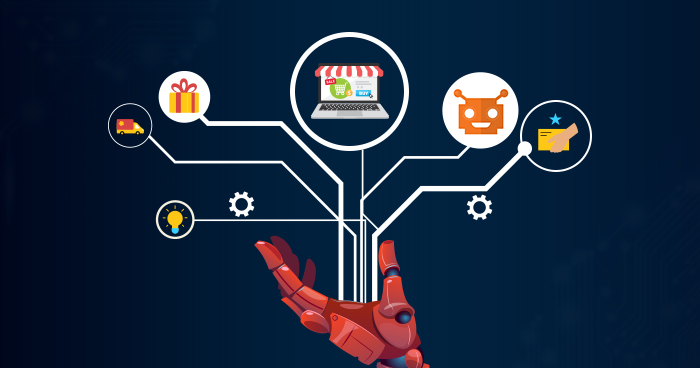
Gone are the days when the mere transition from brick and mortar into an ecommerce store was regarded as a major change in the business model. The influx of new technologies has completely transformed the traditional shopping experience thanks to AI in Ecommerce – the flavor of the year.
Despite the overall hype, there is a concern. Is the use of AI in ecommerce even worth venturing into, and irrespective of its feasibility, does it really have to be implemented in your ecommerce store right now?
Well, if you are, by any means, associated with the ecommerce business, you are advised to pay close attention.
The combination of AI and ecommerce presents endless possibilities that we are going to discuss in this article.
How will Artificial Intelligence in Ecommerce Transform the Shopping Industry?
According to a research by Accenture, AI could potentially boost profitability rates by an average of 38% across 16 industries by 2035.
AI will particularly benefit the retail sector because of its immediate impact on two fundamental areas that have a serious impact in retail ecommerce; creating a very personalised shopping experience and making smart business decisions.
Artificial intelligence in ecommerce is also helping ecommerce platforms to cater the needs and interest of the users. With open-source ecommerce platforms like WooCommerce and Magento available, you can easily integrate Artificial Intelligence tools for Ecommerce Marketing.What is Ecommerce with Examples | Ecommerce or E-commerce
8 Revolutionary Ways of Using AI in Ecommerce
Many ecommerce businesses are already applying artificial intelligence to better understand their customers, improve their customer experiences, increase automation and generate high-quality leads.
How are they doing that? Read our list below and find out.
1. AI-Assisted Product Recommendations
Retailers are able to use Big Data (the collection and compilation of data from different channels, previous transactions and other activities) to determine the trends in the shopping habits. This analysis could be used for personalized product recommendation.
AI not only showcases highly personalized products better, it also assesses customer behavior and provides sophisticated predictions about what a customer really wants. This is actively used to better predict the future purchases and design customized sales strategy based on customer-behavior trends.
How Can You Make This Possible?
Though this aspect of ecommerce marketing isn’t completely unknown, collaborative filtering that uses previous history and general patterns is used by many ecommerce stores. AI enhances this approach by analyzing a huge volume of information, and coupled with deep learning allows for robust personalization.
Using AIs like IBM’s Watson, you have a platform that provides insights by analysing customer behaviour. Amazon is already using several AI technologies to curate recommendations for customers. This recommendations engine is driven by machine learning (ML).

2. Advanced Semantic-Based Search
When we talk about personalization in the context of ecommerce and customer support, right now there is nothing better than intelligent customer engagement at every point of contact.
One of the most important aspects of personalization is the ‘search result’. With advanced semantic-based site search, customers are able to easily navigate the store and find the relevant products without wading through a lot of unnecessary results. AI is now able to understand natural language and clearly interpret the human semantics, generating relevant results.
How Can You Improve Your Search Results?
You can use machine-learning algorithms that decipher a customer’s request. This in turn reveals the true intention of a query and delivers search results that are based on relevance.
One of the biggest ecommerce stores, eBay claims to be on the forefront of practical machine learning research and is working closely to improve user experience and product search by using artificial intelligence in ecommerce. Innovations like Microsoft Cortana also make it easier for people to conduct searches and discover products that best fit the intention of the query rather than just the words.

3. Chatbots
Chatbots might just be the ultimate solution for the customer support woes. The good news is that modern chatbots are able to interact with customer databases and extract details of a customer and respond in the most appropriate and personalized way in real-time.
Consumer demands are rapidly rising and ecommerce businesses are struggling to keep up. The real competition is not about profits anymore, it’s about which business provides a comfortable customer experience that keeps visitors from leaving the website without making a purchase.

4. Virtual Assistants
Another amazing application of artificial intelligence in ecommerce is through virtual assistants. VAs contribute a lot in creating an efficient sales process. These assistants communicate with customers to understand their preferences and provide them with an intuitive shopping experience.
Siri, Google Now, and Alexa are some of the most refined virtual assistant applications out there, today. Some might say that virtual assistants are getting outdated and losing their usefulness, but with newer technologies and better integration options, we believe that there is still a lot of room for advancement.

5. Efficient Company-Wide Decision Making
AI is not science fiction anymore. It is now developed enough to integrate directly within different aspects of ecommerce operations from pricing to assortment management. Using Big Data, retailers can make informed decisions based on valuable insights provided by AI tools.
Pricing and Inventory Management
Pricing products is no more a guess work. AI can use complex learning algorithms that assess market dynamics and all the other relevant factors of market competition. Optimal pricing of the merchandise helps a business stay relevant and ultimately succeed in a competitive environment. Similarly, AI takes the bull by its horns and allows for an efficient inventory and assortment management. This is only achieved when a huge volume of data is effectively and rapidly analyzed to generate actionable insights that could be put to action immediately.
Business Analysis
Putting all the data to use, you can also determine the kinds of products and business actions that have decreased efficiency, increased conversions, and if anything needs readjustments. These comparisons pertain to market share, pricing patterns and overall progress of a business.
All these informed decisions come on the back of an efficient analysis that is only made possible by big data.
Drowning in Data? Find Clarity (Free Ecommerce Sales Analysis Template!)
Stop wasting time and resources on complex data analysis tools. Enjoy gaining sales insights and analyzing trends with our FREE Ecommerce Sales Analysis Template.
Thank You
Your list is on it’s Way to Your Inbox.
How Can You Use AI to Make Smart Business Decisions?
With advanced algorithms, you can use AI to forecast demand, velocity of orders and plan inventory management using various factors including past performances of products. At the same time, all the gathered data can be used to compare and contrast the aspects of your business with the peers in the market.

6. Cybersecurity Enhancement
Ecommerce websites have a ton of customer data that will be vulnerable if there aren’t any proper cybersecurity measures in place. Now, ecommerce business owners can use artificial intelligence to secure their websites. Here’s how:
Detection of New Threats
Unlike traditional software, AI software tend to get smarter with time as new types of malware and threats emerge. Therefore, they will be able to quickly detect malware or ransomware attacks on your website before they’re able to cause any serious problems.
Blocking Out Bots
Bots form a large amount of the internet traffic today, and they can prove to be dangerous. Bots can steal credentials, create fake accounts and cause data fraud. These types of threats are better tackled using AI and machine learning, rather than manually. With the application of artificial intelligence in ecommerce, you can easily distinguish between good bots like search engine crawlers and bad bots that will cause problems for your ecommerce store.

7. Sales Forecasting
Ever since the emergence of the COVID-19 pandemic, sales forecasting and inventory management has become an absolute necessity for every business. To avoid any unforeseen shortages or stock run-outs, ecommerce businesses can now use artificial intelligence for sales forecasting. Software like Mintigo make use of AI to predict future sales based on consumer patterns and help decision-makers predict the results of their marketing efforts.

8. Fighting Fake Reviews
Believe it or not, online reviews can make or break your brand. One fake review from your competitor or a bot can turn things around for your brand. However, fake reviews don’t necessarily have to be bad. If a good fake review is identified by a potential customer, it will most likely send an awful message and you might end up losing that prospect. In fact, 54% of consumers won’t even buy the product if they suspect it to have fake reviews.
This is where the power of artificial intelligence in ecommerce comes in. Many ecommerce stores are starting to use artificial intelligence to tackle fake reviews. Amazon has also built an in-house AI system that detects fake reviews by identifying the review’s characteristics. It also gives prominence to reviews that are made by verified customers and increases their visibility to enhance a customer’s trust in the product.

What Does the Future Have in Store for Ecommerce?
Well, it’s time for the already digitized ecommerce business to get smarter and predict trends. And the technologies behind AI might just be the way forward. AI could help the ecommerce industry in identifying the gaps and what needs to be done in order to enhance the customer experience. Tools like AI image generators, can increase the speed of completing any task thus contributing to overall performance.
Some might say that hype around Artificial Intelligence in ecommerce might have created a bandwagon effect in the digital space, but ignoring it completely can do no good. There might be some hesitation over the economic sustainability related to the application of artificial intelligence in ecommerce right now. But once the use of AI becomes a common practice, it will no longer be an option, but a necessity. And it will definitely brighten the future of the ecommerce industry.
Q1. What is artificial intelligence?
Artificial intelligence is the engineering and science of making smart machines and computer programs which understand human intelligence and perform tasks using that data.
Q2. What are some real-world AI in ecommerce examples?
Many companies around the globe are now using artificial intelligence in ecommerce. For example, Amazon uses AI for customers who want to do voice shopping and to give them better product recommendations. Similarly, inVia Robotics uses AI to enable their robots to work alongside humans and perform various supply chain and logistical tasks.
Mansoor Ahmed Khan
Been in content marketing since 2014, and I still get a kick out of creating stories that resonate with the target audience and drive results. At Cloudways by DigitalOcean (a leading cloud hosting company, btw!), I lead a dream team of content creators. Together, we brainstorm, write, and churn out awesome content across all the channels: blogs, social media, emails, you name it! You can reach out to me at [email protected].
